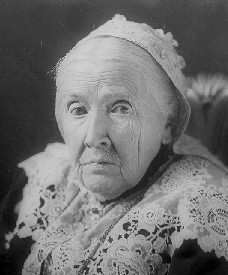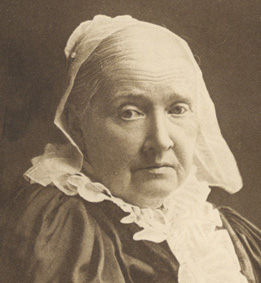Julia Ward Howe
 The
origins of Mother's Day date back centuries, but the seeds to making
it an official national holiday in the United States began with a poet and activist
named Julia Ward Howe.
The
origins of Mother's Day date back centuries, but the seeds to making
it an official national holiday in the United States began with a poet and activist
named Julia Ward Howe.
Born in 1819, Julia would grow up in New York city, one of seven children to Julia Rush Carter and Samuel Ward. Her mother, a poet, would die after giving birth to her last child and left Samuel to raise the children alone.
While Samuel was a educated and established banker on Wall Street, the absence of her mother often left the curious Julia to learn by herself, and she immersed herself in European literature in a time where very few women had the opportunity to do so.
With the help of her brother and her father's connections to the New York social life, Julia would continue to learn from the great literary minds of her time and go on to become a writer herself.
Julia would go on to put her stamp on almost every kind of writing and literary style that existed, She first dabbled in poetry with Passion-flowers in 1854, Words for the Hour in 1857, and Later Lyrics in 1866. Julia would also publish several books throughout her career. In addition to travel books such as A Trip to Cuba, she mainly wrote biographies, including Margaret Fuller and the Memoir of Dr. Samuel Gridley Howe, a hero of the Greek revolution that Julia married in 1843 and had six children with before his death in 1876.
Julia would also go on to contribute columns and articles on topics such as the women' s suffrage movement and even write a few plays, including the Lenora and The World's Own and Hippolytus. However, there would be one important piece of writing in particular that Julia would contribute words to that would make her a celebrity of the 19th century.
She would have some very important, first hand experiences with the abolitionist movement and the Civil War that would influence her most famous literary work. Her husband Samuel briefly distributed a newspaper known as The Commonwealth in their city of Boston, which heavily favored abolishing slavery, The Howe's would become a part of the movement, developing relationships and funding individuals like Jim Brown, known for he infamous raid in Harper's Ferry, VA.
Later on, Howe would visit a Union army campy near the Potomac River. Here she over heard soldiers singing the tune "Jim Brown's Body", and was inspired to write a poem to the same music. The poem would be published the following year as the "Battle Hymn of the Republic", and would become the Union's patriotic anthem.
Mine eyes have seen the glory of the coming of the Lord:
He is trampling out the vintage where the grapes of wrath are stored;
He hath loosed the fateful lightning of His terrible swift sword:
His truth is marching on.(Chorus) Glory, glory, hallelujah!
Glory, glory, hallelujah!
Glory, glory, hallelujah!
His truth is marching on.I have seen Him in the watch-fires of a hundred circling camps,
They have builded Him an altar in the evening dews and damps;
I can read His righteous sentence by the dim and flaring lamps:
His day is marching on.Chorus
His day is marching on.
I have read a fiery gospel writ in burnished rows of steel:
"As ye deal with my contemners, so with you my grace shall deal;
Let the Hero, born of woman, crush the serpent with His heel,
Since God is marching on."Chorus
Since God is marching on.
He has sounded forth the trumpet that shall never call retreat;
He is sifting out the hearts of men before His judgment-seat:
Oh, be swift, my soul, to answer Him! be jubilant, my feet!
Our God is marching on.Chorus
Our God is marching on.
In the beauty of the lilies Christ was born across the sea,
With a glory in His bosom that transfigures you and me:
As He died to make men holy, let us die to make men free,
While God is marching on.Chorus
While God is marching on.
He is coming like the glory of the morning on the wave,
He is Wisdom to the mighty, He is Succour to the brave,
So the world shall be His footstool, and the soul of Time His slave,
Our God is marching on.
Chorus
Our God is marching on.
 In
addition to her role during the abolishinist movement and the Civil War, Julia
Ward Howe would also play important parts in the women's suffrage movement as
well. Coming from such a wealthy and elite background, Julia's life changed
significantly after her marriage to Samuel. Being much older than Julia, Samuel
had a strict code of conduct that he expected her to live by, a conduct that
would play a role in fueling her social activism later in life.
In
addition to her role during the abolishinist movement and the Civil War, Julia
Ward Howe would also play important parts in the women's suffrage movement as
well. Coming from such a wealthy and elite background, Julia's life changed
significantly after her marriage to Samuel. Being much older than Julia, Samuel
had a strict code of conduct that he expected her to live by, a conduct that
would play a role in fueling her social activism later in life.
Samuel took over her finances (which included her inheritance) and Julia's duties became those of a traditional wife at the time: tending to her husband and the children. Julia never did fit into that role very quietly, which kept there relationship one on the rocks, and eventually separating. Throughout their marriage, Samuel would spend most of Julia's inheritance on bad investments, leaving her a working class mother, far from the lifestyle she grew up in. In addition, he tried to discourage her from getting her writings out in the public's hands.
Nevertheless, by the 1870''s Howe's celebrity from her poetry and writings allowed her to have a voice that could be heard. She would travel the world as a preacher of the Women's rights movement.
Julia Ward Howe would be the first to propose a "mother's day". In 1870 she introduced her "Mother's Day Proclamation", which was based on her experiences as a wife and mother throughout her suppressive marriage and the atrocities she witnessed while living through the Civil War. It was her belief that women should have more social responsibility beyond tending to her husband, and she used her gift of pose to spread the message:
Arise, then, women of this day!
Arise, all women who have hearts,
Whether our baptism be of water or of tears!
"We will not have great questions decided by irrelevant agencies,
Our husbands will not come to us, reeking with carnage, for caresses and applause.
Our sons shall not be taken from us to unlearn
All that we have been able to teach them of charity, mercy and patience.
We, the women of one country, will be too tender of those of another country
To allow our sons to be trained to injure theirs."
From the bosom of the devastated Earth a voice goes up with our own.
It says: "Disarm! Disarm! The sword of murder is not the balance of justice."
Blood does not wipe out dishonor, nor violence indicate possession.
As men have often forsaken the plough and the anvil at the summons of war,
Let women now leave all that may be left of home for a great and earnest day of counsel.
Let them meet first, as women, to bewail and commemorate the dead.
Let them solemnly take counsel with each other as to the means
Whereby the great human family can live in peace,
Each bearing after his own time the sacred impress, not of Caesar,
But of God.
In the name of womanhood and humanity, I earnestly ask
That a general congress of women without limit of nationality
May be appointed and held at someplace deemed most convenient
And at the earliest period consistent with its objects,
To promote the alliance of the different nationalities,
The amicable settlement of international questions,
The great and general interests of peace.









